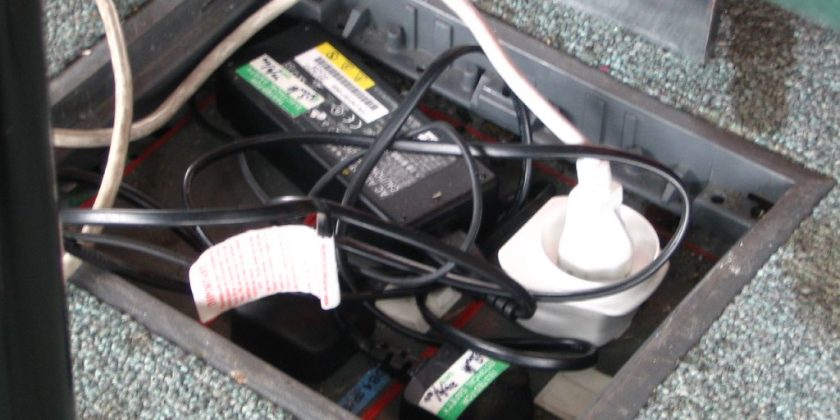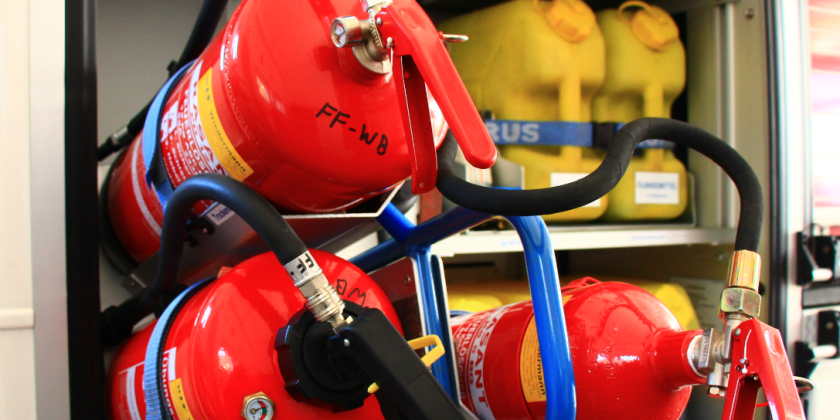Boost Your EPC Rating: 10 Expert Tips to Improve Your Property’s Energy Efficiency
Improving your property’s Energy Performance Certificate (EPC) rating is not only beneficial for the environment but can also save you money in the long run. With a multitude of simple yet effective strategies available, understanding how to improve EPC rating can be a game-changer for your home’s energy efficiency. In this comprehensive guide, we will provide you with 10 expert tips to enhance your property’s own energy efficiency rating, ensuring you have the knowledge and tools to boost your EPC rating and create a more sustainable living space.
Understanding Your EPC Rating
What is an EPC Rating?
An Energy Performance Certificate (EPC) is a standardised document that rates the energy efficiency of a property on a scale from A (most efficient) to G (least efficient). It provides a summary of energy performance-related features and offers recommendations for improvement. Introduced in England and Wales in 2007, EPCs are a legal requirement for anyone selling or renting out a home.
The EPC includes information about a property’s energy use, typical energy costs, and suggests ways to reduce energy consumption and save money. It’s similar to the labels provided with domestic appliances such as refrigerators and washing machines. An improved EPC rating not only signifies lower energy bills but also shows a commitment to reducing carbon emissions, making a property more attractive to prospective buyers or tenants interested in sustainability.
Importance of a Good EPC Rating
A good EPC rating is increasingly crucial in today’s property market. It signifies that a property is energy-efficient, which can lead to substantial cost savings on utility bills. This is a key consideration for homeowners and tenants alike, as energy costs continue to rise. Furthermore, an improved EPC rating can enhance the property’s value and appeal in the competitive real estate market.
For landlords, a good EPC rating is not just advantageous—it’s often a legal requirement. Certain regulations, such as the Minimum Energy Efficiency Standards (MEES) in England and Wales, mandate that rented properties meet specific minimum energy efficiency standard and criteria. Failure to comply can result in fines.
Finally, there’s the environmental aspect. A property with a good EPC rating contributes less to carbon emissions, aligning with broader environmental goals and regulations. As society becomes more eco-conscious, properties with better EPC ratings will stand out as more responsible choices for occupants.
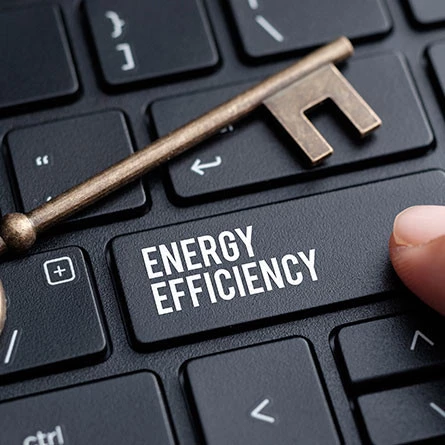
Assessing Your Property’s Energy Efficiency
Evaluating Your Current EPC Rating
To begin improving your home’s energy efficiency, you must first understand your current EPC rating. You can find your property’s EPC, typically valid for 10 years, on the EPC Register website if your home has been assessed in the past. This rating will give you a clear starting point and help identify areas for improvement.
The EPC report breaks down various elements of your property, such as insulation, heating systems, and lighting, and grades each according to their energy efficiency. It also estimates the potential rating your property could achieve with recommended enhancements. By evaluating these details, you can prioritise the most impactful changes.
If your property doesn’t have an EPC, or it has expired, you’ll need to have a new assessment carried out by an accredited assessor. This step is essential not only for legal compliance when selling or renting but also for setting a benchmark for your energy efficiency improvements.
Identifying Areas for Improvement
Once you have your current EPC rating, the next step is to scrutinise the report for areas that need improvement. The report usually lists measures that can enhance the property’s energy efficiency, along with an indication of cost and the expected impact on the EPC rating.
Typically, you’ll want to look for the quickest wins first—these are improvements that are relatively inexpensive and easy to implement but can significantly affect your energy efficiency. Examples might include adding draught-proofing, upgrading lighting to LED bulbs, or increasing loft insulation.
It’s also wise to consider the bigger, more costly changes that require long-term planning, like replacing an old boiler with a more efficient model, installing double glazing, or adding renewable energy technology such as solar panels. These investments can dramatically improve your rating and reduce energy bills over time.
By methodically addressing each area listed in to improve your property’s epc and EPC, you can systematically enhance your property’s energy efficiency and EPC rating.
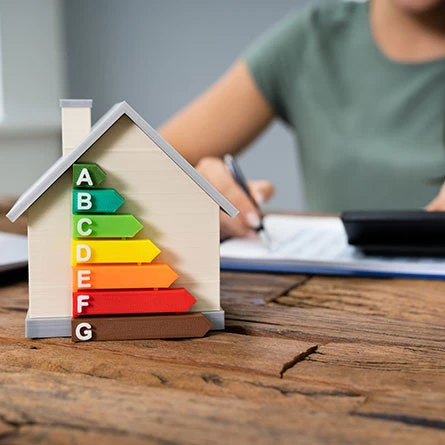
Expert Tips to Boost Your EPC Rating
Improving Insulation
Enhancing your property’s insulation is one of the most effective ways to boost your EPC rating. Good insulation helps to retain heat during winter and keep your home cool in summer, thereby reducing the need for excessive heating or air conditioning. This, in turn, leads to lower energy consumption and cost savings.
Start by checking the loft or attic space of detached house; it’s often the easiest place to add insulation and can make a significant difference. Next, consider cavity wall insulation if your property has unfilled walls. For homes with solid walls, external or internal wall insulation can be an option, though it’s more invasive and costly.
Don’t forget to insulate your pipes and hot water tank, which can prevent heat loss and improve the efficiency of your heating system. While some insulation tasks can be DIY, professional installation ensures maximum effectiveness and safety, particularly for more complex jobs.
By prioritising insulation, you can make a noticeable improvement to your EPC rating and create a more comfortable living environment.
Upgrading Your Heating System
A heating system upgrade can significantly impact your EPC rating. Older boilers, especially those over a decade old, tend to be inefficient and costly to run. Upgrading to a new, energy-efficient boiler can reduce your energy usage and keep heating bills down. Modern boilers are more reliable and often come with better heating controls, allowing for more precise temperature management throughout your home.
Consider renewable heating solutions such as heat pumps or biomass boilers, which can provide an even greater improvement to your EPC rating. Although the initial investment for these technologies is higher, they can offer long-term savings and might be eligible for government incentives.
Adding modern heating controls, like programmable thermostats or smart heating systems, can further improve energy efficiency. These allow you to control your heating remotely and adjust settings to match your schedule, avoiding unnecessary energy use.
Upgrading heating systems not only improves energy efficiency but also enhances the overall comfort of your home.
Investing in Energy-Efficient Appliances
When it comes to improving your EPC rating, the appliances you choose can have a substantial impact how much energy used. Investing in energy-efficient appliances is a practical move as they consume less energy and cost less to run. Look for products with a high Energy Star rating, which indicates higher efficiency.
Appliances such as refrigerators, washing machines, and dishwashers often have eco-friendly settings that reduce energy consumption. Although these appliances might have a higher upfront cost, the savings on your energy bills can offset this over time.
It’s also important to maintain your appliances to ensure they operate at peak efficiency. Simple actions like regularly defrosting your fridge, cleaning the filters in your dishwasher, or using the correct load size in your washing machine can all contribute to energy saving.
By choosing and maintaining energy-efficient appliances, you can make a positive step towards a better EPC rating and a more sustainable home.
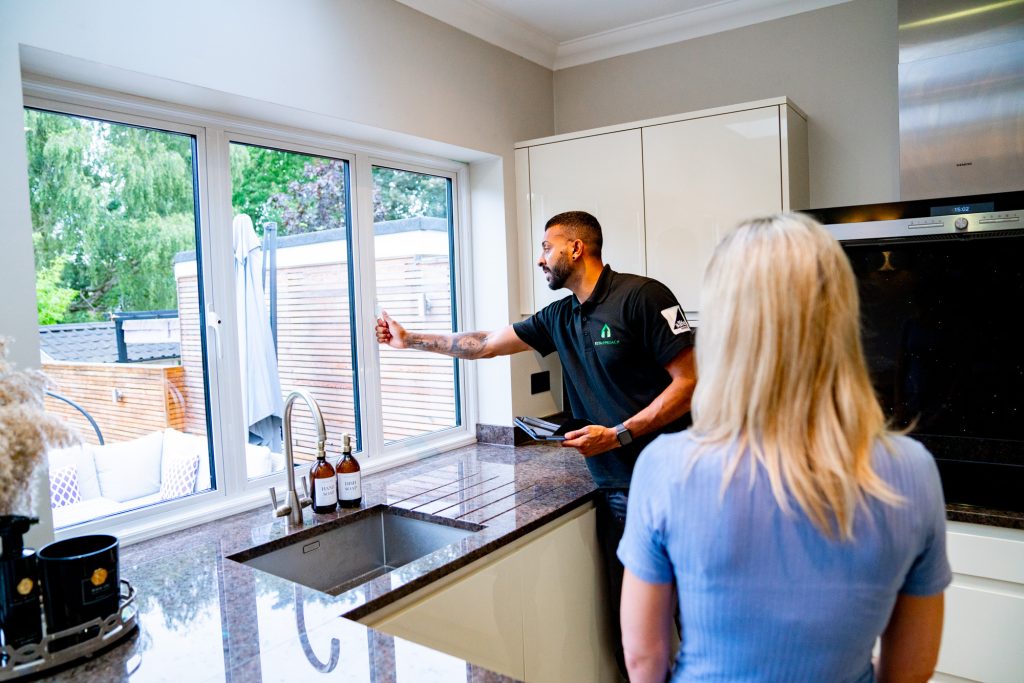
The Role of Renewable Energy in EPC Ratings
Solar Power and Your EPC Rating
Integrating solar power can have a significant positive effect on your property’s EPC rating. Solar photovoltaic (PV) panels convert sunlight directly into electricity, which can be used to run household appliances and lighting, thereby reducing your reliance on the grid and lowering your energy bills.
The installation of solar panels is seen as a forward-thinking step in property development. It reflects a commitment to sustainable living and can substantially increase a property’s appeal to eco-conscious buyers or tenants. Additionally, installing solar panels for energy can provide protection against rising energy prices by generating your own electricity.
While the initial cost of solar panel installation can be high, the long-term savings on energy bills and potential government incentives can make it a worthwhile investment. Plus, any excess electricity can often be sold back to the grid, creating a potential income stream and further improving the cost-effectiveness of solar power.
By adopting solar energy, you’re not only improving your EPC rating but also contributing to a greener future.
Other Renewable Energy Options
Beyond solar power, there are other renewable energy options that can boost your property’s EPC rating. Wind turbines, for example, can be an effective solution in areas with consistent wind patterns. Small-scale wind energy systems can generate electricity for home use, surplus of which can sometimes be sold back to the energy grid.
Ground source heat pumps are another sustainable option. They use the earth’s natural heat to provide heating and hot water for your home. While the installation involves significant upheaval and expense, they are extremely energy efficient lighting and can lead to long-term savings and a higher EPC rating.
Biomass heating systems, which burn organic materials like wood pellets or chips, are also considered to install renewable energy sources and can be a more carbon-neutral way of heating your home. These systems are particularly effective in properties that aren’t connected to the gas grid.
Incorporating any of these renewable energy sources into your home can contribute to a greener environment and a more favourable EPC rating.
The Impact of Improved EPC Ratings on Property Value
How Energy Efficiency Affects Property Value
Energy efficiency is increasingly becoming a deciding factor in the rental property market. An improved EPC rating can significantly boost your property’s value as potential buyers or tenants often consider the long-term energy cost savings. Homes with higher EPC ratings typically have lower utility bills, making them more attractive from a financial perspective.
The market value of a property is also influenced by its environmental impact. A higher EPC rating indicates a property’s lower its carbon dioxide emissions footprint, appealing to environmentally conscious individuals. Additionally, as energy prices continue to rise, the demand for energy-efficient homes is expected to increase, pushing their market value further up.
Governments and local authorities are progressively tightening regulations around energy efficiency, which may soon impact the saleability of properties with poor EPC ratings. Improving your home’s energy efficiency is not just a win for the environment and your wallet, but it’s also a strategic investment in the future value of your property.
Future-Proofing Your Property with a Better EPC Rating
Enhancing your property’s EPC rating is a strategic move towards future-proofing your investment. As energy efficiency becomes more important to buyers and tenants, properties with better EPC ratings are likely to be in higher demand. This means that investing in energy-efficient improvements now can set your property apart in the future real estate market.
Improving your EPC rating also prepares your property for potential changes in legislation. Governments are setting more ambitious targets for reducing carbon emissions, and this may translate into stricter building regulations and requirements for energy efficiency in homes.
Furthermore, a better EPC rating can shield homeowners from the volatility of energy prices. With a more energy-efficient home, you’re less dependent on external energy sources, which means you’re better positioned to handle increases in energy costs.
Taking steps to improve your EPC rating today is an investment that can pay dividends by making your property more marketable, compliant, and economically resilient in the years to come.


